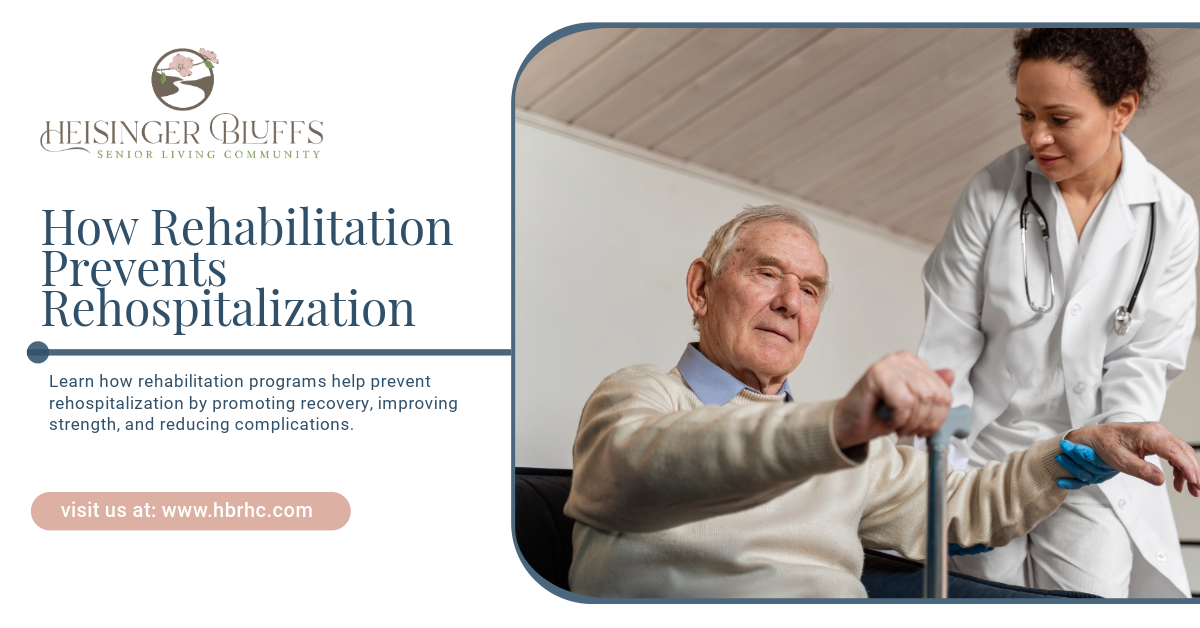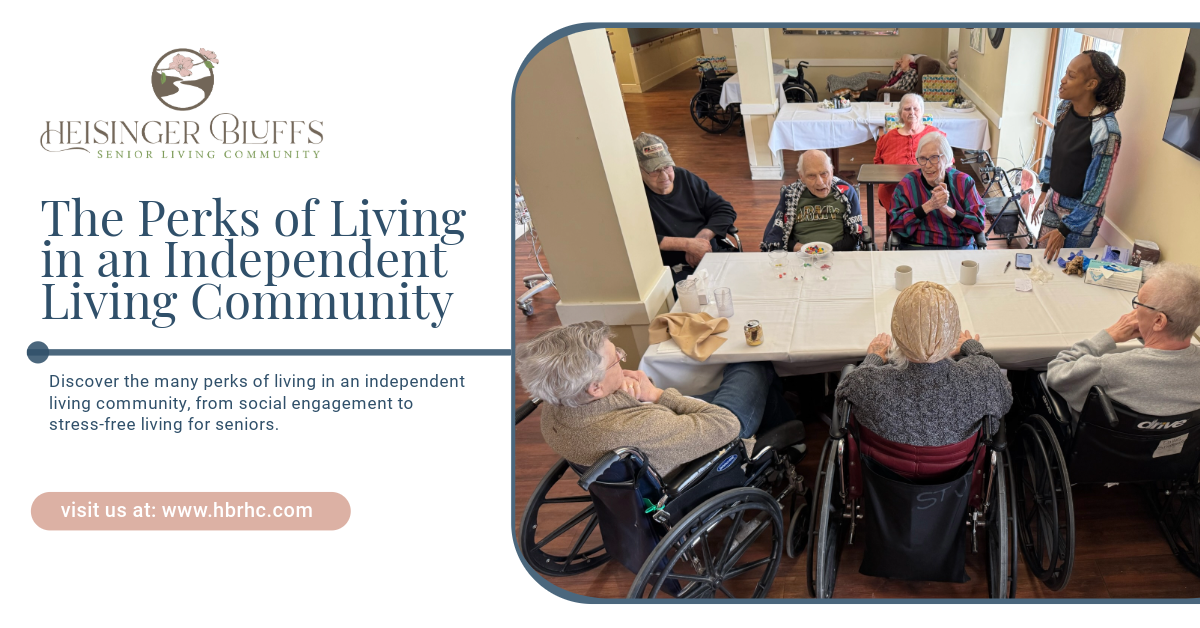Get in touch
How Rehabilitation Prevents Rehospitalization

Rehospitalization is a significant concern for many patients recovering from surgery, illness, or injury, especially among older adults. After a hospital stay, individuals often face a period of recovery where proper care and rehabilitation are crucial to regaining their health and preventing further health complications. One of the most effective ways to reduce the risk of rehospitalization is through rehabilitation.
In this blog, we’ll explore how rehabilitation programs can help prevent rehospitalization, the role of rehabilitation in post-hospital care, and how tailored rehabilitation services can improve health outcomes for seniors.
What is Rehospitalization and Why Does it Occur?
Rehospitalization refers to the situation where a patient is readmitted to the hospital after being discharged. This can occur for various reasons, such as complications from the original condition, inadequate recovery, or the emergence of new health issues during the recovery period.
For seniors, the risk of rehospitalization is higher due to factors like chronic conditions (e.g., heart disease, diabetes), weakened immune systems, and the increased vulnerability that comes with aging. Other contributing factors include:
- Delayed Recovery: If patients don't receive proper post-hospital care or follow-through on rehabilitation, their recovery may be delayed, leading to complications and the need for rehospitalization.
- Medication Mismanagement: Seniors may struggle with managing complex medication regimens after discharge, which can lead to adverse effects or hospital readmission.
- Mobility Issues: Patients recovering from surgery or illness may experience difficulty with mobility, leading to falls, injuries, and subsequent rehospitalization.
- Infections and Complications: Without proper care, seniors may develop infections (e.g., pneumonia, urinary tract infections) or experience worsening symptoms of pre-existing conditions.
Rehospitalization is a serious issue, as it can extend recovery times, negatively impact health, and increase medical costs. That’s why rehabilitation plays such an important role in ensuring that individuals recover fully, regain their independence, and avoid returning to the hospital.
How Rehabilitation Prevents Rehospitalization
Rehabilitation programs, especially those offered after hospital discharge, are designed to provide the necessary care, support, and monitoring to help individuals recover efficiently and safely. By addressing physical, emotional, and cognitive needs, rehabilitation helps reduce the risk factors that contribute to rehospitalization.
Here’s how rehabilitation can help prevent rehospitalization:
1. Promotes Faster Recovery and Healing
After a hospital stay, rehabilitation programs are designed to help patients regain strength, mobility, and independence. Tailored rehabilitation programs include physical therapy, occupational therapy, and speech therapy, all of which are designed to enhance physical recovery.
- Physical Therapy: Improves strength, flexibility, and balance, which can reduce the risk of falls and mobility issues that may lead to rehospitalization.
- Occupational Therapy: Focuses on helping individuals regain the ability to perform daily activities like dressing, bathing, cooking, and managing personal care, which promotes independence and reduces the need for hospitalization due to complications.
- Speech Therapy: Helps individuals recover from speech or swallowing difficulties, which can improve overall health and prevent complications related to malnutrition or aspiration pneumonia.
Rehabilitation programs that are carefully designed for each individual’s specific needs can help them recover faster, minimizing the risk of complications that could lead to rehospitalization.
2. Monitors and Manages Chronic Conditions
Many seniors who are discharged from the hospital have chronic conditions that require ongoing management, such as heart disease, diabetes, or respiratory conditions. Proper rehabilitation ensures that these conditions are closely monitored and managed to prevent exacerbation and hospitalization.
- Medical Monitoring: Through rehabilitation, trained professionals can monitor vital signs, such as heart rate, blood pressure, and oxygen levels. If any of these vital signs deviate from the normal range, prompt intervention can help prevent further complications.
- Medication Management: Rehabilitation programs often include medication education to ensure patients understand how to take their medications properly. Mismanagement of medications is a common cause of rehospitalization, but education and support can reduce errors.
With rehabilitation programs focused on the ongoing management of chronic conditions, seniors can stabilize their health and avoid returning to the hospital.
3. Reduces the Risk of Falls and Injury
Falls are a leading cause of rehospitalization in seniors. Rehabilitation programs place a strong emphasis on improving balance, strength, and coordination to reduce the risk of falls.
- Strength and Balance Exercises: Tailored exercises help strengthen muscles and improve coordination, which can significantly reduce the risk of falls.
- Fall Prevention Education: Rehabilitation also includes education on fall prevention strategies, such as using assistive devices, making home modifications (like removing tripping hazards), and using proper footwear.
By addressing fall risks through rehabilitation, seniors can regain mobility and independence without the worry of re-injury that could lead to rehospitalization.
4. Supports Nutritional Needs
After a hospital stay, it’s crucial to ensure that individuals receive the proper nutrition to aid their recovery. Poor nutrition can slow down healing, impair immune function, and lead to weight loss, making a person more vulnerable to health complications.
- Nutritional Guidance: Rehabilitation services often include guidance on proper nutrition, especially for those with specific dietary needs (e.g., low-sodium diets for heart patients or high-protein diets for muscle recovery).
- Monitoring Eating Habits: For individuals recovering from surgeries that affect their ability to eat or swallow, speech therapists and dietitians can provide guidance on safe eating habits to prevent aspiration and malnutrition.
Proper nutrition, supported by rehabilitation professionals, plays an essential role in preventing rehospitalization by promoting healing and overall well-being.
5. Enhances Mental Health and Emotional Well-being
Rehospitalization isn’t just about physical health – mental and emotional well-being also plays a significant role in recovery. Depression, anxiety, and isolation are common in individuals recovering from illness or surgery. When left unaddressed, these emotional challenges can delay recovery and increase the likelihood of rehospitalization.
- Mental Health Support: Many rehabilitation programs offer counseling, social support, and activities designed to reduce anxiety and depression, helping individuals maintain a positive outlook during recovery.
- Cognitive Rehabilitation: For individuals recovering from neurological conditions (e.g., stroke or dementia), cognitive rehabilitation programs can help improve memory, focus, and overall cognitive function.
Rehabilitation programs that address mental and emotional health can help individuals avoid rehospitalization by enhancing overall well-being and supporting recovery.
6. Prepares Patients for Independence
One of the main goals of rehabilitation is to help patients regain their independence. A lack of independence after surgery or illness often leads to complications such as poor self-care, falls, or malnutrition, which can all contribute to rehospitalization.
- Home Preparation: Occupational therapists can help individuals adapt to their home environment by suggesting modifications, such as grab bars in the bathroom or ramps at doorways, that make it easier to move around safely.
- Self-care Training: Rehabilitation programs help patients develop the skills they need to care for themselves, from managing medications to performing daily activities, promoting independence and reducing reliance on others for care.
By focusing on preparing patients to live independently, rehabilitation programs reduce the likelihood of complications that could lead to rehospitalization.
Conclusion
Rehabilitation is a crucial part of the recovery process after a hospital stay, especially for seniors. By promoting faster recovery, managing chronic conditions, preventing falls, and supporting overall well-being, rehabilitation programs significantly reduce the risk of rehospitalization. With the help of professional rehabilitation services, seniors can regain their strength and independence, avoid unnecessary hospital readmissions, and improve their quality of life.
If you or a loved one is recovering from surgery or illness, consider a rehabilitation program that emphasizes comprehensive care and support. Heisinger Bluffs provides exceptional rehabilitation services that focus on the individual needs of each resident, ensuring a smoother recovery process and a reduced risk of rehospitalization.
Frequently Asked Questions
How long should a rehabilitation program last?
The duration of a rehabilitation program depends on the individual’s health, the type of surgery or illness, and their progress in recovery. Most rehabilitation programs last between a few weeks to several months, with adjustments made as needed.
Can rehabilitation prevent all rehospitalizations?
While rehabilitation can significantly reduce the risk of rehospitalization, it cannot guarantee that it will never happen. However, proper rehabilitation can address many of the factors that lead to readmission, such as medication mismanagement, mobility issues, and poor nutrition.
What is the difference between physical therapy and rehabilitation?
Physical therapy is a component of rehabilitation that focuses on improving mobility, strength, and function. Rehabilitation is a broader term that encompasses a variety of therapeutic services, including physical therapy, occupational therapy, speech therapy, and mental health support, all designed to promote overall recovery and well-being.



Want to know more?
We will get back to you as soon as possible.
Please try again later.
You May Also Like To Read
Heisinger Bluff’s Life Plan Community is here to make your senior years safe, stimulating and enjoyable so that you can savor the present, knowing the future will be taken care of.
QUICK LINKS
CONTACT
©2024. Heisinger Bluffs. All rights reserved.








